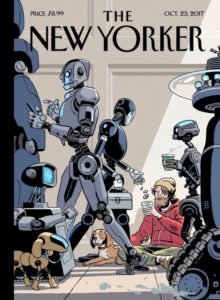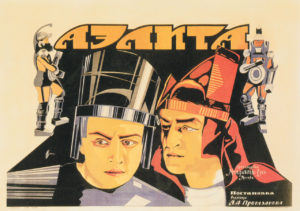 What’s happening to my generation’s children, the Millennials, is similar but also worse than what happened to my generation, Generation X. At least my generation had a lot of terrible, entry level jobs in the service sector to start in. We knew late stage capitalism was shit but at least we had something.
What’s happening to my generation’s children, the Millennials, is similar but also worse than what happened to my generation, Generation X. At least my generation had a lot of terrible, entry level jobs in the service sector to start in. We knew late stage capitalism was shit but at least we had something.
The kids now? Not so much.
Uber and Amazon aren’t cutting it. Jobs writing code won’t be enough to replace the jobs lost when robots drive all the fleet vehicles or stack products on all our shelves. It continues to surprise me that people are still surprised by this: innovation is not creating as many jobs as it destroys.
Way back in 1991, when I was working in one of a spotty, desperate career of endless entry level jobs in small businesses, I had a lengthy conversation with my boss about what computers, robots and automation were going do the economy in the long run. I was in my 20s then and it all seemed far away so it was still safely interesting instead of alarming. We were both smart, if seemingly directionless, guys. The work we were doing was staggeringly dull so we hashed it out for a couple of days of conversation. The conclusion for me seemed pretty hopeless, I knew exactly what the problem was–eventually more jobs would be destroyed than created–but he and I couldn’t find a satisfactory solution. It was depressing if distant.
Fast forward through the 1990s, the gigantic, planetary, intergovernmental project called the Internet was opened to the public. This gave a giant shot in the arm to the US economy. The Internet, specifically the World Wide Web, gave me first decent job: temporary work at Microsoft doing data entry. This, in turn, got me another temp job in another group at the same company where I maintained a subsite below the Microsoft domain.
In July 2000, Microsoft offered me a full time job as programmer–even though I wasn’t really a programmer, my boss and his brother wrote the code. I just maintained and tweaked it. Anyway, I turned it down for complicated reasons that I’ve only begun to fully articulate now. (Another essay at some point.)
In one sense this was a terrible mistake, I could have had a lot more green in my savings and investments that I currently do, my retirement prospects could have been lot better than they are now. But now, nearly 30 years later, I’m older and can’t be so cavalier as I was back when I was 37. It is very likely I will continue to work even into retirement, all the way until death. Anyway it’s water under the bridge now so let’s move on.
I only outline this personal history to explain that, even though I don’t have any kids myself, I can understand the desperation they currently feel.
(Honestly, I’ve always felt just a shade too much empathy for the kids, that’s why I didn’t want to bring any into this hellworld. But that’s another essay.)
Anyway, in the last 5 years I did learn of a practical solution to the discussion I had with my friend back in 1991. It is one that has existed in one form or another, almost two centuries. And now the discussion around this idea, basic income, is heating up. More and more people are taking notice of it. Is it a small step on the way to fully automated luxury gay space communism or, even better, Iain Bank’s Culture?
 Idiots on the right side of the aisle have suddenly decided to hate it, even though the idea has had a lot of support from the right wing for decades. The arguments of these idiots are easy enough dismiss, even for me, as a non-economist. The arguments against basic income from the left are more subtle and harder for me, as a lefty, to dismiss.
Idiots on the right side of the aisle have suddenly decided to hate it, even though the idea has had a lot of support from the right wing for decades. The arguments of these idiots are easy enough dismiss, even for me, as a non-economist. The arguments against basic income from the left are more subtle and harder for me, as a lefty, to dismiss.
Given the current political climate it seems very unlikely to me that UBI will be instituted in the United States any time soon. I mean my country is still so utterly ignorant and barbarous as to think that the idea of a national health service is godless commie talk. But I wrote this essay in my tiny, neglected corner of the Internet as a way to quickly sum up my thoughts on the matter and as a way to quickly reply to skeptics of the idea.
